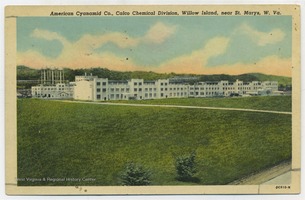 | Back to e-WV
| Back to e-WV
 The West Virginia Encyclopedia
The West Virginia Encyclopedia
 | Back to e-WV
| Back to e-WV
 The West Virginia Encyclopedia
The West Virginia Encyclopedia

The 1978 ‘‘fetus protection policy’’ instituted by the American Cyanamid’s Willow Island Plant in Pleasants County was used in an attempt to coerce five female employees to undergo surgical sterilization. Two women who chose not to be sterilized were moved to lower-paying jobs in other departments. The policy provided that female employees of child-bearing age could not hold jobs that exposed them to toxic substances at levels unsafe for fetuses. It made exception, however, for women who chose surgical sterilization.
In October 1979, the Department of Labor fined American Cyanamid $10,000. It maintained that the company’s policy itself was a workplace hazard that caused serious physical harm, and that the policy thereby violated the Occupational Safety and Health Act. The company contested the fine. The Oil, Chemical and Atomic Workers International Union joined the Department of Labor as a party in the dispute. After the company won two administrative hearings, the union appealed to the U.S. Court of Appeals.
The court ruled that the company’s fetus protection policy did not constitute a hazard within the meaning of the law. The union and the aggrieved women then pursued another route. They filed litigation claiming that American Cyanamid’s policy was a form of sexual discrimination which violated Title VII of the Civil Rights Act of 1964. By 1984, the company agreed to settle that suit out of court. Although the suit did not establish a legal precedent, the women pioneered anti-discrimination arguments that were ultimately accepted by the U.S. Supreme Court.
Written by Chuck Smith
Oil, Chemical & Atomic Workers International Union v. American Cyanamid Company. 741 Federal Reports 2nd 444. 3rd Cir. 1984.